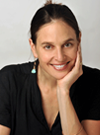8 March 2012
By Ruth Eglash
Ronit Heyd, director of Shatil, is of the opinion that “hope should and could be the driving force behind our decisions and actions.”
 Ronit Heyd, Age: 37
Ronit Heyd, Age: 37
Profession: Director of Shatil – leading social change, an initiative of the New Israel Fund.
Place of birth: New Jersey (By chance. My parents, both Israelis, were there for my father’s PhD work)
Current residence: Ein Kerem, Jerusalem
■ What issue gets you out of bed in the morning? My two‐year‐old daughter calling in my ear: “Ima, pita” (that’s her favorite breakfast). And knowing that a full and exciting day is waiting for me, working with amazingly inspiring and creative people who are dedicated to making Israel a more just, democratic and shared society. Following last summer’s protests, we’re seeing an incredible awakening of civil society, with more and more people wanting to take part in creating social change. We have a lot to do.
■ What issue keeps you up at night? How to continuously improve the work that we’re doing, making it clearer, more impactful, and how we can reach out to new communities that share our goals. I am gravely concerned about the effect of what seems to be a growing trend of nationalist and religious extremism which could fundamentally change the face of our society. We’re seeing more and more legislative efforts that are aiming to limit freedom of expression, the rights of the Arab minority in Israel, or the very basic rules of the democratic game. But apart from that, I’m usually dead tired after a jampacked day that includes work, spending some time with my kids, and then more work, so I fall asleep fairly quickly.
■ What’s the most difficult professional moment you’ve faced so far? Having to cut programs and staff due to ending of project budgets.
■ Why do you do what you do? I believe in people, and I believe in change. That’s why I’ve always wanted to work at Shatil. It’s the place where change happens. I can’t see myself doing anything else. I love working in an organization that is a microcosm of Israeli society, with staff who are Jews and Arabs, veteran Israelis and immigrants from Ethiopia and the former Soviet Union, gay and straight, Ashkenazi and Mizrahi.
■ If you were prime minister, what’s the first thing you would do? [Big sigh…] There is so much to do. I would anchor civil, social and human rights in fundamental laws, in order to secure religious freedom, the democratic nature of Israel and the right to live in dignity for all citizens. I would ensure that every child gets free and good quality education, an education that respects and encourages pluralism of thought and liberal values, and puts more emphasis on respect of all humankind – love someone as you love yourself – instead of only constantly striving for excellence and achievements.
■ Which Israeli should have a movie made about him/her? My mother‐in‐law. She made aliya from Morocco in the early ’60s, raised eight children plus six foster children and was (and still is, at the age of 65) a child caregiver. Like so many women, she has worked extremely hard in very poor conditions for many years in the most “transparent job” – caring for children and doing housework. Besides, she’s an excellent cook and I love her.
■ What would you change about Israelis if you could? I would add to each of us 5 kilos of patience and 50 kilos of tolerance. And I would get people to stop littering and polluting our nature. It drives me mad.
■ iPad, BlackBerry or pen and paper? BlackBerry. It’s the best way to multitask. Without it I feel almost crippled.
■ If you had to write an advertisement to entice tourists to come to Israel, what would it say? Beautiful country, great weather, wonderful people, and the best place to understand the existential meaning of the word “balagan [muddle].”
■ What is the most serious problem facing the country? Instead of seeing ourselves as sovereign, we still relate to ourselves as victims. It makes us constantly – as a nation and as people – feel under threat. There is a new generation now, a growing number of people who believe hope should and could be the driving force behind our decisions and actions. I’m one of those.
■ How can it be solved? We have to ensure Israel continues to have a strong and vibrant civil society. That is the essence of our democracy, of our unique ability to hold such diversity while maintaining social cohesion at the same time. We need to continue supporting and strengthening the leadership and groups who are committed to working toward diminishing social and economic gaps, achieving full equality between Jews and Arabs, and maintaining our democratic character. There are so many of us out there doing this. We need to join forces and take these values down to earth by translating them to social action and to new politics.
■ In 20 years, the country will be: I really, really, really hope we will manage to hold the tensions we have within us, and ensure this country is a place where each person can live in dignity and according to his or her values and beliefs. Otherwise, we’re in deep trouble.
This article originally appeared in Jerusalem Post, click here to view the article as published.
